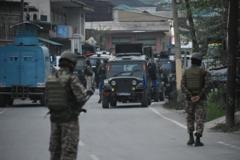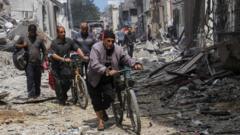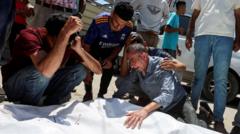The moves mark a significant escalation in ongoing tensions between the nuclear-armed neighbors, as both nations exchange accusations of aggression and blame.
**India Strikes Pakistan Following Deadly Kashmir Attack**

**India Strikes Pakistan Following Deadly Kashmir Attack**
India conducts military strikes against targets in Pakistan and Pakistan-administered Kashmir after a militant assault kills 26.
Two weeks after a tragic militant assault in Indian-administered Kashmir that resulted in 26 fatalities, India has initiated a series of military strikes targeting locations within Pakistan and Pakistan-administered Kashmir. The Indian Defense Ministry referred to these strikes as "Operation Sindoor," asserting they are part of a commitment to hold accountable those responsible for the April 22 attack, which claimed the lives of 25 Indians and one Nepali national. In contrast, Pakistan has vehemently denied any involvement in the attack, labeling India's military actions as "unprovoked," with Prime Minister Shehbaz Sharif vowing that the "heinous act of aggression will not go unpunished."
According to reports, Pakistan's military claims to have shot down five Indian aircraft and a drone, although India has not confirmed these incidents. Meanwhile, Pakistani authorities allege that the strikes have resulted in the deaths of eight civilians; conversely, India has reported civilian casualties in response to Pakistani shelling in Indian-administered Kashmir.
The Indian government revealed that nine areas were targeted early Wednesday morning, asserting these were sites of "terrorist infrastructure" used for planning attacks. They emphasized that military installations were not struck and characterized their actions as "focused, measured, and non-escalatory." Conversely, Pakistani Defence Minister Khawaja Asif criticized India's claims, stating that the strikes had predominantly affected civilian areas.
India's decision to carry out these strikes arises amid escalating tensions between the two nations, following the deadly shooting incident in the resort town of Pahalgam. Survivors reported that militants were deliberately targeting Hindu males during the attack - the most lethal against civilians in the region for the last two decades. Indian Prime Minister Narendra Modi vowed that those involved would face severe consequences. However, India has not publicly identified any groups behind the attack. Allegations regarding Pakistani nationals' involvement remain contentious, with Pakistan denying any links to the militants.
In the two weeks leading up to the strikes, both nations engaged in a diplomatic showdown, including expelling diplomats, halting visa processes, and shutting border crossings. Historical precedents, such as the aftermath of the Pulwama terror attack in 2019 – which led to major cross-border military exchanges – raised concerns about the potential for escalating conflict.
The Kashmir region has been a longstanding flashpoint between India and Pakistan since their respective separations following British colonial rule in 1947. Both nations lay claim to the entirety of the territory but only govern portions. The long history of armed insurgency in the area has fueled military confrontations, particularly in light of militant activities targeting military personnel and civilians.
Following the revocation of Kashmir's semi-autonomous status in 2019, a marked shift in the conflict dynamics emerged, with an initial decline in militancy and increased tourism. The retaliatory nature of the recent strikes followed stark woundings dating back to previous attacks, emphasizing the ongoing fragility of peace in the region. Global entities, including US President Donald Trump and UN Secretary-General Antonio Guterres, have urged restraint, signaling the potential for international concern should the situation worsen further.





















